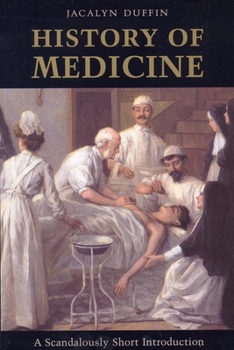History of Medicine: A Scandalously Short Introduction
Select Format
Select Condition 
Book Overview
Jacalyn Duffin's History of Medicine provides a brief survey of the history of Western medicine with reference to recent scholarly literature and current issues in health care. Organized conceptually around the major fields of medical endeavour - anatomy, physiology, pathology, pharmacology, surgery, obstetrics, psychiatry, pediatrics, and family medicine - this book is an accessible overview of medical history as a vibrant component of social, intellectual, and cultural history, and as a research discipline in its own right. Each chapter begins in antiquity and ends in the twentieth century. Throughout, Duffin shows that alternative interpretations can be found for most elements of our past and that topics of interest can go well beyond 'great men' and 'great discoveries' to include ideas, diseases, patients, institutions, and great mistakes. This approach does not mean that the 'great men' (and women) are neglected; rather they appear in context. Medical disasters such as chloramphenicol and thalidomide, are covered along with the triumphs, and examples from Canada's past, largely ignored in other medical histories, are included. A chapter on methodology, suggestions for further reading with special attention to Canadian sources, and a careful index make it possible to research a specific event or historical debate, or to satisfy a more general curiosity. By presenting the material in a structure that resonates with the broad outlines of medical training, and by focusing on the questions asked most often, this text is a relevant guide for students to the history of the profession they are about to embrace, and for those who would teach them, be they physicians or historians. Duffin's clear and entertaining prose and the many illustrations will help to demystify medicine for general readers and for students in other domains, such as history, philosophy, and sociology.
Format:Paperback
Language:English
ISBN:0802079121
ISBN13:9780802079121
Release Date:October 1999
Publisher:University of Toronto Press, Scholarly Publishing Division
Length:384 Pages
Weight:1.84 lbs.
Dimensions:9.0" x 1.1" x 6.0"
Customer Reviews
1 rating
Wondering where the Canadian Health Care System is Headed?
Published by Thriftbooks.com User , 26 years ago
Why would anybody other than a medical historian (or an aging doctor such as myself) be interested in a book on the history of medicine? Jacalyn Duffin gives us all the answer in the final chapter of this book (How to Research a Question in Medical History) when she writes: "No medical subject - be it a person, a practice, an institution, a technology, or an idea - can be fully explored without also studying its political, social, economic, and cultural environment." In this introductory text (compiled from medical student lectures at Queen's University) one gets a clear view of how medicine reflects society, and how health care providers are influenced by non-medical factors in society at large. Although this is not a textbook of Canadian medical history, it is written by a Canadian for a Canadian audience. This is particularly valuable as many of us who are wondering where the Canadian health care system is heading, can get at least an overview from this text of how our current system developed.The text is organized by topic (e.g. History of Anatomy) rather than as a continuous chronology. This makes the reading much simpler for a relatively uninformed reader, as only one concept at a time is explored. As well, chapters can be read in any order, depending on the reader's particular interests. The exceptional nature of this book is probably based on the relatively rare characteristics of the author: she is a practicing physician (haematologist) as well as a formally trained historian. As a result the book covers both important historical trends as well as the difficulties facing individual practitioners as they try and alleviate human suffering.My favourite chapter was entitled "Science of Suffering: History of Pathology." The reader is given a clear understanding of how the concept of `disease' developed, and both the strengths and weaknesses of this diagnostic labelling. The chapter on blood (Why is Blood Special?) literally `pulses' with excitement and enthusiasm, obviously reflecting the author's particular interests as well as the historical importance of the topic.Throughout this text, there is a refreshing absence of both medical jargon and dense academic prose, making reading the book an enjoyable process. My one quibble is that Professor Duffin's elegant descriptions of the importance of a population approach to health fails to ask one question that always intrigues me. Does the focus on a population health approach have within it the inevitable potential to put differential values on human life? Was the eugenics movement a result of a `population health' perspective? In Canada, with universal medicare and no private practice option (as occurs in the United Kingdom), might someone with an `unimportant' disease eventually be `uncovered' by medicare? Does focusing on the greater good inevitably result in inhumane or unfair treatment to some? Perhaps a topic for a second edition.So once





